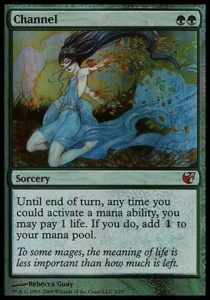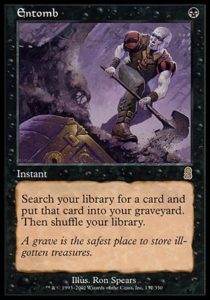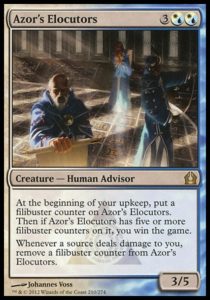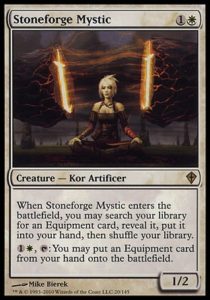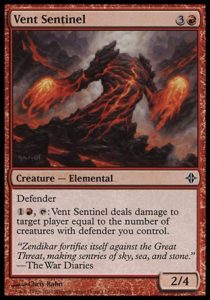I had a very strong reaction to the feedback I received from last week’s cube draft and former Pondering author Li Xu’s comment on my associated article. I heard from him and others that my cube needs more combo. I have a strong, innate disagreement with this sentiment, but rather than just reject something I disagree with (which is a bad thing to do), I’d like to do my best to articulate my feelings and position.
To do this, I’ll first need to define what combo is. I think that combo is generally refers to one of two things: combos and combo decks.
(If you disagree with my definitions here, then please respond in the comments with your disagreement and/or definitions. I do not consider myself an expert of all things combo and want to accurately represent and define combo as best as possible. To do any less is to weaken my argument.)
1. A combo is a combination of two or more cards that have a powerful, often game-winning effect. Such combos often, but not always do something an infinite/arbitrarily large number of times. For example:
- Splinter Twin + Pestermite (creates infinite hasty creatures)
- Melira, Sylvok Outcast + Murderous Redcap + Viscera Seer (does infinite damage, scries infinite times)
- Channel + Fireball + Black Lotus (does a large amount of damage, can kill opponent before their first turn)
- Time Vault + Voltaic Key (infinite turns)
- Wake Thresher + Basalt Monolith (creates an infinitely large Wake Thresher)
- Jeskai Ascendancy + Retraction Helix + Altar of the Brood + Tormod’s Crypt + any creature (infinite milling, infinite looting)
- Painter’s Servant + Grindstone or Rest In Peace + Helm of Obedience (infinite milling)
- Gifts Ungiven + Unburial Rites + expensive creature (cast almost any creature for 3W)
- Thopter Foundry + Sword of the Meek (pay 1 to gain 1 life and get a 1/1 flying thopter)
2. A combo deck is designed to win by assembling a combo (sometimes with a non-combo Plan B). It plays along an unusual axis/doesn’t play ‘normal’ Magic. Oftentimes, but not always, these decks play few to no creatures and have no Plan B. These decks are often, but not always, difficult to interact with (particularly without counterspells, hand disruption, or dedicated hate cards).
- Modern/Legacy/Cube Storm builds up to one big turn where it casts a large number of spells and then casts Grapeshot/Tendrils of Agony/Brain Freeze to kill the opponent with a large amount of damage/milling. Modern Storm generally only plays Goblin Electromancer; Legacy Storm generally plays zero creatures.
- Legacy/Cube Reanimator decks try to quickly cheat out powerful creatures (like Griselbrand, Iona, Shield of Emeria, Tidespout Tyrant, or Elesh Norn, Grand Cenobite) without paying their mana costs. Generally, they put a big creature in the graveyard quickly via cards like Entomb, Looter il-kor, Oona’s Prowler, or Careful Study, then put them onto the battlefield with Reanimate, Exhume, or Animate Dead.
- Vintage/Cube Tinker decks generally do the same, except by combining cheap artifact mana with Tinker or powerful mana producers like Mana Vault/Metalworker/Channel to quickly play cards like Sphinx of the Steel Wind, Sundering Titan, or Blightsteel Colossus. Alternatively, they can use Tezzeret the Seeker, Tinker, Transmute Artifact, or Kuldotha Forgemaster to assemble game-winning combos like Time Vault + Voltaic Key.
- Legacy/Cube Sneak and Show also cheat out threats like Tinker and Reanimate do, employing Show and Tell, Sneak Attack, Eureka, or Through the Breach. These cards are frequently employed in Cube Tinker/Reanimate decks as alternate methods of cheating creatures into play.
- Modern Living End abuses the combination of Violent Outburst/Demonic Dread + Living End (since Living End is the only card in the deck with a converted mana cost less than 3) + creatures with inexpensive cycling costs. This combo kills of the opponents’ creatures while putting a stocked graveyard of cycled creatures onto the battlefield.
It’s worth noting that of these archetypes, Reanimator, Tinker, and Sneak and Show have basically the same end goal (circumventing expensive mana costs of high power creatures) with different engines. This is by no means an exhaustive list of combo decks, but several of them (storm and cheating mana costs) are generally considered staple cube combo deck archetypes.
3. Lastly, I’d like to define these terms in relation to cube.
- A combo is a small collection of cards that, if assembled, will have a strong impact on the game. An assembled combo can potentially end the game immediately.
- A combo deck is one that is dedicated to executing a combo to win. Or rather, you’re not just playing fair Magic. So, I should probably define that, too:
- Fair Magic is playing creatures, planeswalkers, and/or removal for their mana costs. You’re generally looking to win via damage, usually by attacking with creatures.
The Dividing Line between Combo and Synergy
I have a difficult time distinguishing a combo from synergy. Infinite combos that win the game (like Splinter Twin, Vault/Key, and Melira combo) are clearly defined and the cornerstones of archetypes. However, other combos provide a large benefit, but are neither infinite, nor do they immediately end the game. Thopter Foundry + Sword of the Meek, Gifts Ungiven + Unburial Rites, Entomb + Exhume, and Violent Outburst + Living End are very powerful combos, but are neither infinite nor (necessarily) immediately game-winning. How are they distinct from the following combos?
- Stoneforge Mystic + Batterskull (get a consistent, difficult-to-kill, recursive 4/4 lifelink for two installments of 1W)
- Survival of the Fittest + Recurring Nightmare (spend G and sacrifice a creature to reanimate any creature in your deck)
- Notion Thief + Whispering Madness (opponent discards their hand and you draw lots of cards)
- Sliver Queen + Heartstone + Ashnod’s Altar (make infinite sliver tokens)
- The Abyss + Awakening Zone (only your opponent has to sacrifice creatures to The Abyss (as long as you have at least one token before The Abyss is played))
- Pili-Pala + Grand Architect (infinite colored mana)
- Bloom Tender + Freed from the Real (infinite nonblue mana)
Most of these combinations are definitely weaker than the aforementioned mentioned combos. However, Stoneforge Mystic + Batterskull and Survival of the Fittest + Recurring Nightmare are strong enough to have been banned. All of them rely on synergistic interactions between cards.
We can stretch this definition even further with the following card combinations:
- Lord of Atlantis + Master of the Pearl Trident (really big Merfolk)
- Heritage Druid + 3x Nettle Sentinel (every green spell nets you GGG; with Glimpse of Nature you can draw your entire deck)
- Arbor Elf + Wild Growth (doubles the effectiveness of Wild Growth)
- Vent Sentinel + Vent Sentinel (doubled effectiveness of Vent Sentinel)
We’ve definitely crossed a line here out of combo and into synergy. Splinter Twin is an obvious combo and the cornerstone of a deck; Vent Sentinel is… better with itself, but not the most powerful interaction. I’d like to try and zero in on where something stops being considered a combo.
We could say that an unanswered combo immediately wins the game, but then Thopter Foundry + Sword of the Meek, Entomb + Reanimate don’t count. Heck, it’s still possible to lose once you’ve assembled Time Vault + Voltaic Key, since you still need a way to win the game. Many of our obvious combos don’t win the game, at least not immediately. So then, how do we distinguish combo from mere synergy? And what effect, if any, does this have on our definition of combo decks?
We’ll have to wait until next week to dive deeper into this question. I’m going to further explore the distinction between combo and synergy, see how this changes the definition of a combo deck, and argue against the necessity of certain combo decks in cube. Please comment below—I’d love to hear your opinion, position, definitions, or constructive criticism. And, as always, thanks for reading!
—Zachary Barash
Zachary Barash has been playing Magic on and off since 1994. He loves Limited and drafts every available format (including several that aren’t entirely meant to be drafted). He’s a proud Cube owner and improviser, creating entire musicals from scratch every week. Zach has an obsession with Indian food that borders on being unhealthy.

